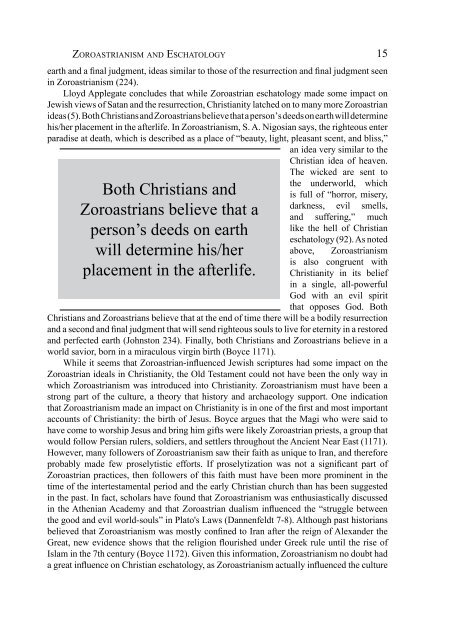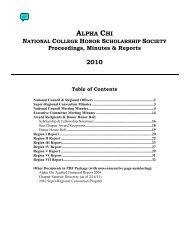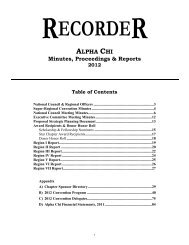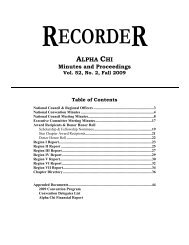Vol. 52, No. 1, 2009 - Alpha Chi
Vol. 52, No. 1, 2009 - Alpha Chi
Vol. 52, No. 1, 2009 - Alpha Chi
You also want an ePaper? Increase the reach of your titles
YUMPU automatically turns print PDFs into web optimized ePapers that Google loves.
Zo r o a s t r i a n i s m a n d Es c h at o l o g y<br />
earth and a final judgment, ideas similar to those of the resurrection and final judgment seen<br />
in Zoroastrianism (224).<br />
Lloyd Applegate concludes that while Zoroastrian eschatology made some impact on<br />
Jewish views of Satan and the resurrection, Christianity latched on to many more Zoroastrian<br />
ideas (5). Both Christians and Zoroastrians believe that a person’s deeds on earth will determine<br />
his/her placement in the afterlife. In Zoroastrianism, S. A. Nigosian says, the righteous enter<br />
paradise at death, which is described as a place of “beauty, light, pleasant scent, and bliss,”<br />
an idea very similar to the<br />
Christian idea of heaven.<br />
The wicked are sent to<br />
Both Christians and<br />
Zoroastrians believe that a<br />
person’s deeds on earth<br />
will determine his/her<br />
placement in the afterlife.<br />
15<br />
the underworld, which<br />
is full of “horror, misery,<br />
darkness, evil smells,<br />
and suffering,” much<br />
like the hell of Christian<br />
eschatology (92). As noted<br />
above, Zoroastrianism<br />
is also congruent with<br />
Christianity in its belief<br />
in a single, all-powerful<br />
God with an evil spirit<br />
that opposes God. Both<br />
Christians and Zoroastrians believe that at the end of time there will be a bodily resurrection<br />
and a second and final judgment that will send righteous souls to live for eternity in a restored<br />
and perfected earth (Johnston 234). Finally, both Christians and Zoroastrians believe in a<br />
world savior, born in a miraculous virgin birth (Boyce 1171).<br />
While it seems that Zoroastrian-influenced Jewish scriptures had some impact on the<br />
Zoroastrian ideals in Christianity, the Old Testament could not have been the only way in<br />
which Zoroastrianism was introduced into Christianity. Zoroastrianism must have been a<br />
strong part of the culture, a theory that history and archaeology support. One indication<br />
that Zoroastrianism made an impact on Christianity is in one of the first and most important<br />
accounts of Christianity: the birth of Jesus. Boyce argues that the Magi who were said to<br />
have come to worship Jesus and bring him gifts were likely Zoroastrian priests, a group that<br />
would follow Persian rulers, soldiers, and settlers throughout the Ancient Near East (1171).<br />
However, many followers of Zoroastrianism saw their faith as unique to Iran, and therefore<br />
probably made few proselytistic efforts. If proselytization was not a significant part of<br />
Zoroastrian practices, then followers of this faith must have been more prominent in the<br />
time of the intertestamental period and the early Christian church than has been suggested<br />
in the past. In fact, scholars have found that Zoroastrianism was enthusiastically discussed<br />
in the Athenian Academy and that Zoroastrian dualism influenced the “struggle between<br />
the good and evil world-souls” in Plato's Laws (Dannenfeldt 7-8). Although past historians<br />
believed that Zoroastrianism was mostly confined to Iran after the reign of Alexander the<br />
Great, new evidence shows that the religion flourished under Greek rule until the rise of<br />
Islam in the 7th century (Boyce 1172). Given this information, Zoroastrianism no doubt had<br />
a great influence on Christian eschatology, as Zoroastrianism actually influenced the culture









